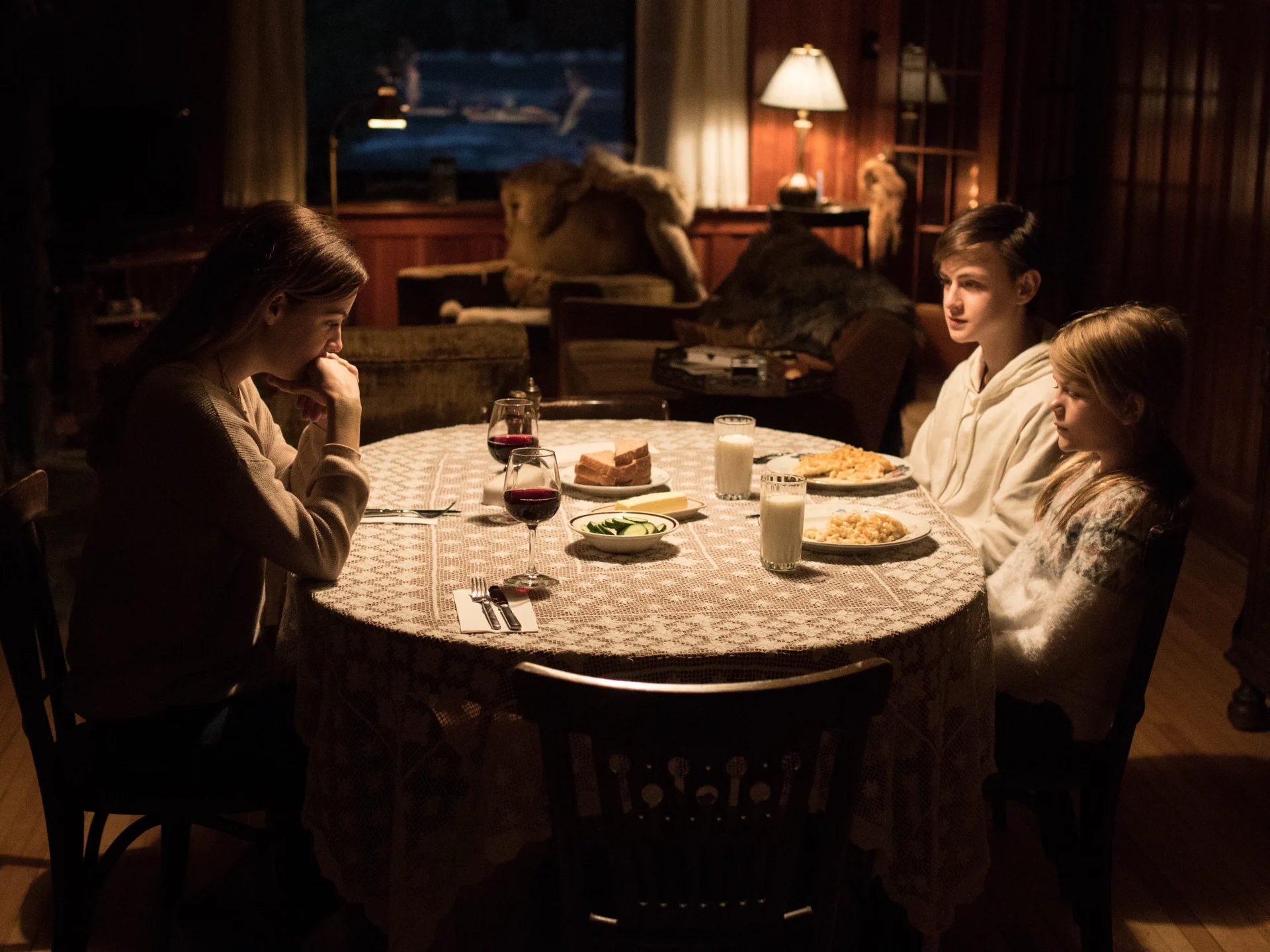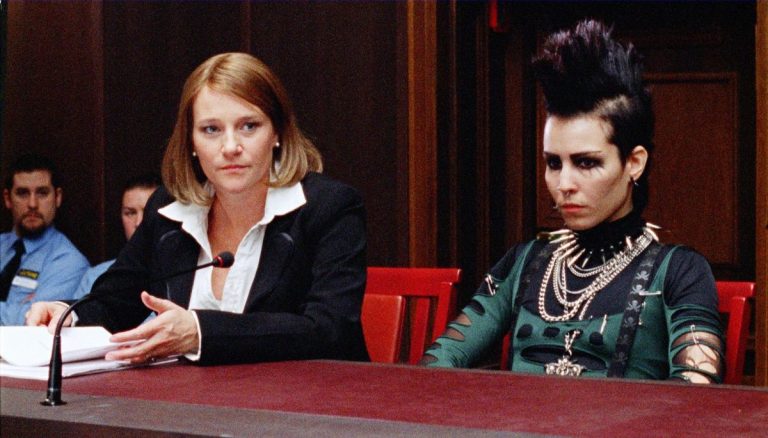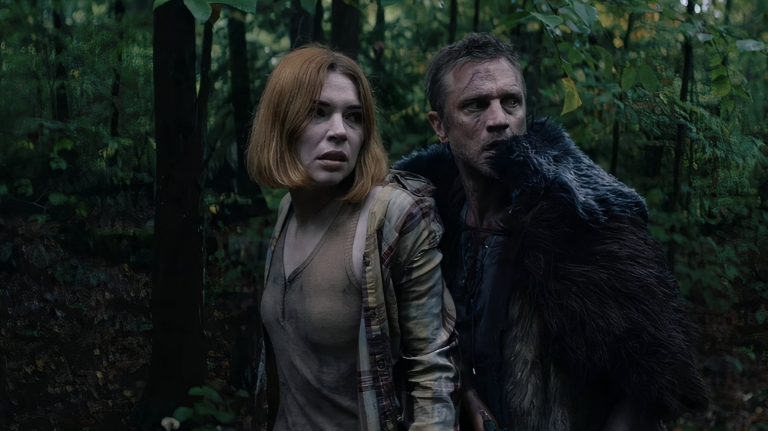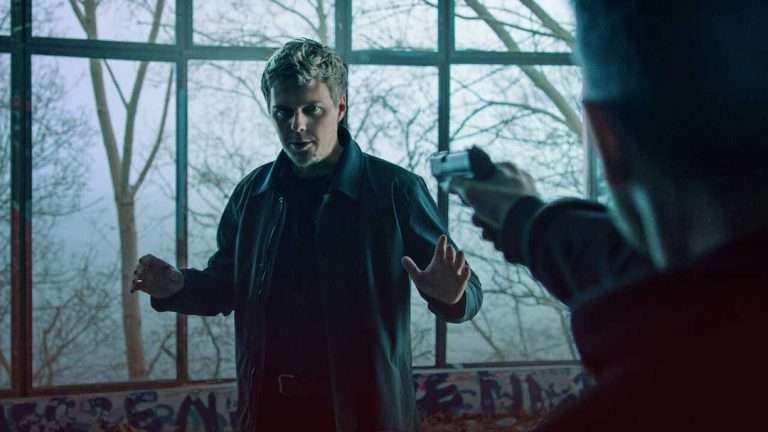Directed by Severin Fiala and Veronika Franz, the 2019 psychological thriller The Lodge leaves a lasting impression for many reasons, but none more so than its complex and chilling protagonist, Grace. Brought to life by Riley Keough’s riveting performance, Grace serves as the emotional core of this haunting narrative.
The story revolves around the Hall family, where siblings Aiden and Mia are grappling with the devastating loss of their mother. Their father, Richard, complicates matters further by announcing his engagement to Grace, thrusting her into their fractured lives. Consumed by grief and resentment, Aiden and Mia reject Grace, blaming her—and her dark history as a cult survivor—for their family’s tragedy. Can Grace bridge the chasm between her and the siblings while confronting her own haunted past? Let’s delve into the layers of this psychological puzzle to uncover the answers.
Spoilers Ahead.
The Lodge (2019) Plot Summary and Movie Synopsis:
Why Do Aiden and Mia Hate Grace So Much?
“The Lodge” opens with Aiden and Mia’s mother Laura killing herself. Laura and Richard weren’t been together for a long time but Laura hopes that things will fall into place and they will live happily together. She even puts on makeup to make herself attractive in Richard’s eyes. However, Richard has moved on and is in a serious relationship with Grace. Grace is not well-received by the children and Laura for obvious reasons. When Richard tells Laura that he has decided to marry Grace and that he needs the divorce done quickly, Laura loses all hope.
Aiden and Mia’s hatred towards Grace stems from their unresolved grief over their mother, Laura. Her sudden suicide left them devastated, searching for someone to blame. Grace becomes an easy target as Laura’s death directly follows Richard’s announcement of his intention to marry her. To the children, Grace represents the disruption of their family and the source of their mother’s despair. This emotional burden amplifies their resentment toward her.
What do Aiden and Mia Find about Laura?
The siblings view Grace as a threat to their family dynamic. Their father’s insistence on spending Christmas with her at the lodge forces them into an uncomfortable situation they are not ready to face. Grace’s presence symbolizes the permanent shift in their lives — one that feels imposed and alien. Their hostility is partly a defense mechanism to shield themselves from further emotional pain.
Upon researching Grace’s history, Aiden and Mia discover her connection to a cult that ended in a mass suicide. This revelation fuels their fear and mistrust. To them, Grace’s past isn’t just dark; it is a symbol of danger and instability. They question her morality and fear what her traumatic experiences might mean for their safety and well-being. The association with something as sinister as a death cult only deepens their aversion.
Aiden and Mia’s hatred is a complex mix of grief, fear, and resistance to change. They project their pain and anger onto Grace, whom they see as the catalyst for their mother’s death and the dismantling of their family. No matter how much they want to avoid Grace, Richard’s persuasion leaves the siblings with no chance but to spend a few days at the lodge with her. Richard thinks that it will be a good time to bond with Grace.
What Happens to Grace at the Lodge in the Beginning?
At the lodge, Grace struggles to navigate the hostile environment created by Aiden and Mia. The siblings refuse to engage with her attempts to bond, and their coldness exacerbates her feelings of isolation. Their antagonism leaves Grace unsettled and uncertain about her place in the family dynamic. This emotional tension sets the tone for her stay.
Grace’s unease deepens when she encounters the lodge’s Catholic iconography. Items like the reproduction of The Virgin Annunciate remind her of the oppressive religious doctrines from her past. These triggers cause recurring nightmares about her father, who led the cult she survived. The psychological burden of these memories weighs heavily on Grace, affecting her ability to connect with the children or find peace in the lodge.
Despite the tension, there is a fleeting moment of normalcy. After an awkward incident where Aiden spies on her in the shower, he attempts to reconcile by preparing her a cup of cocoa. The group even watches a movie together. However, the moment is short-lived. The siblings use a gas heater indoors without considering the risks, an act that subtly reflects their disregard for Grace’s concerns when she questions its safety. In the beginning, Grace faces emotional and psychological challenges at the lodge. The children’s hostility and the resurfacing of her traumatic past amplify her discomfort. Although there is a brief attempt to bridge the gap, the underlying tension remains unresolved.

Why Do Aiden and Mia Gaslight Grace Using Purgatory?
Aiden and Mia manipulate Grace by orchestrating a scenario that destabilizes her. They hide all of her belongings, including her psychiatric medication and essentials like food, while tampering with the environment to heighten confusion. By cutting off external communication and power, they isolate Grace from reality, making it harder for her to rationalize what is happening. This calculated chaos sets the stage for gaslighting.
Aiden and Mia plant the idea that they have all died and are in purgatory. Aiden fabricates a story about dreaming of a gas heater malfunction, suggesting they suffocated in their sleep. They reinforce this narrative by altering clocks and presenting fabricated evidence, such as a memorial frame and a newspaper article reporting their deaths. These details exploit Grace’s fragile mental state, pushing her to question her reality.
The siblings use Grace’s cult trauma to deepen her psychological breakdown. Aiden’s staged hanging plays into her fear of death and survival guilt, mirroring the collective suicides of her past. His survival after the act creates an eerie sense of the supernatural, further convincing Grace that they are trapped in purgatory. This manipulation taps into her unresolved guilt and religious trauma, causing her to spiral into despair.
Aiden and Mia’s gaslighting hinges on exploiting Grace’s vulnerabilities: her isolation, withdrawal symptoms, and traumatic past. By fabricating evidence and staging events, they distort her perception of reality. Their actions are driven by a desire to punish her, but their cruelty also reflects their own unresolved grief and anger.
The Lodge (2019) Movie Ending Explained:
What does Grace do to Richard?
After discovering their deception and the death of her beloved dog, Grace loses her grip on reality. Convinced that they are in purgatory, she becomes consumed by her indoctrinated belief that penance is necessary for salvation. This warped worldview drives her to act with alarming severity.
Grace imposes her cult-like understanding of redemption on Aiden and Mia. She burns herself as a form of self-flagellation, a direct reflection of her father’s teachings, believing that pain is a pathway to purification. When she confronts the children, her insistence on sacrifice escalates. She sets fire to Mia’s doll, symbolically rejecting earthly attachments, and forces the siblings to comply with her distorted view of divine atonement.
The situation spirals into tragedy when Richard returns to the lodge. Grace, convinced she and the others are already dead, uses his revolver to demonstrate her belief. When the gun fails to fire at her, she interprets it as proof they are in purgatory. Her delusion drives her to kill Richard, mistaking the act as a divine judgment. This violent turning point solidifies her control over Aiden and Mia, as their attempts to escape fail.
Does Grace Kill Aiden and Mia?
Grace forces the children back into the lodge, seating them at the dinner table alongside their father’s corpse. She eerily recreates the rituals from her father’s cult, affixing duct tape labeled “sin” over their mouths. By singing a hymn, she fully immerses herself in her belief that this act will lead to salvation.
The loaded gun on the table symbolizes the looming threat of further violence, completing her transformation into the very figure of terror the siblings feared. Grace’s actions are driven by a delusional need to enforce penance, stemming from unresolved trauma and the psychological manipulation she endured. Her breakdown reveals the devastating consequences of combining religious indoctrination with unaddressed mental health issues.
In the end, it becomes evident that Grace will ultimately kill Aiden and Mia, followed by taking her own life to absolve herself of the sin she believes she has committed. Aiden and Mia’s actions bring out the traumatic past Grace was desperately trying to escape, making them victims of it alongside Richard.






